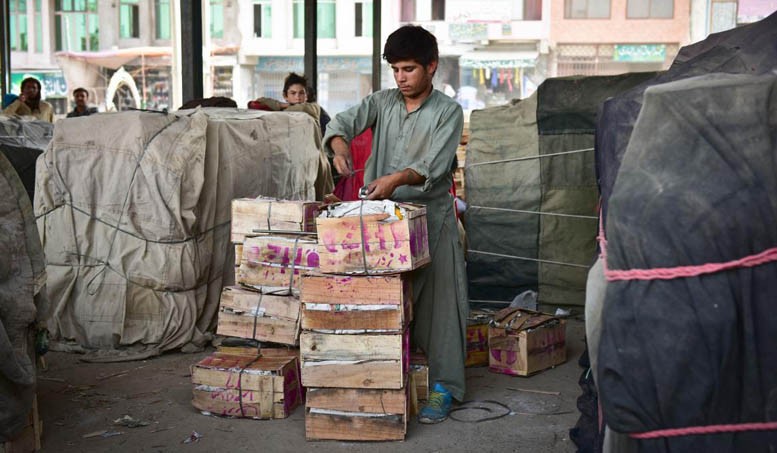
Loan schemes are unlikely to increase employment opportunities for the youth in Pakistan

Tayyab Jehanzaib a 29-year-old resident of Rawalpindi is of the view that Rs0.5 million is nothing but a pittance for starting a business. According to him, the economic situation of the country has deteriorated to such an extent that even the affluent are worried. "If professional businessmen are feeling the impact, how can a young Pakistani with little to no experience, set up a successful business with as little as Rs0.5 million?" Jehanzaib comments on Prime Minister Imran Khan’s recently launched Kamayab Jawan programme for the technical and financial assistance of the youth in Pakistan.
The first phase of the programme was launched across the country on October 17, under which Rs100 billion have been allocated for youth loans, out of which Rs25 billion are reserved for women.
Contrary to Tayyab Jehanzaib, Adnan Shaffi, co-founder of Price Oye, an online Shopping Platform says money is not the most important ingredient for a successful business, "I started my first online business with just one thousand rupees. That online portal was later purchased by a multinational company." According to Shaffi, "ideas matter more than money. You could be a millionaire, but unless you have a good idea, you can’t become a successful entrepreneur."
Under the National Youth Development Framework (NYDF) there are six different programs; the prime minister’s Youth Entrepreneurship Scheme; Hunarmand Jawan Program; Green Youth Movement; National Internship Program; Startup Pakistan Program and Youth Engagement Platform (Jawan Markaz). A total of Rs24 billion has been allotted for these programs, though officials say that this amount may change as per requirement.
In the first phase of NYDF, the Youth Entrepreneurship Scheme will lend more than Rs10 billion rupees to successful candidates from all provinces. Loans up to Rs5,000,000 can be availed for the setting up of new business or expansion of an existing one.
Loans from Rs100,000 to Rs500,000 will be given on a markup of six percent per annum. Whereas loans amounting from Rs500,000 to Rs50,00000 will be given out on a fixed markup of eight percent per annum. Youth belonging to 45 undeveloped districts are eligible to avail loans to up to Rs0.1 million on an interest free basis.
Loans from Rs100,000 to Rs500,000 will be given on a markup of six percent per annum. Whereas loans amounting from Rs500,000 to Rs50,00000 will be given out on a fixed markup of eight percent per annum.
Regional Manager of SMEDA in Rawalpindi, Muhammad Asghar says, "SMEDA gives detailed guidelines about the application submission process, as well as how to make business plans and feasibility reports for new businesses."
Asghar explains that for the first year, the borrower will have to pay back the markup amount only, which is about Rs4,000 per month on a loan to upto Rs0.5 billion. For the next year, the instalment will include the principal value along with the markup. The total amount will have to be given back in instalments over eight years.
According to statistics, Pakistan is the fifth most populous country in the world. 64 percent of its population is below the age of 30 and 29 percent of the total population is aged between 15 to 29 years.
Head of Department of Economics, University of Swabi Govt, Arsalan Khan suggests that the government needs to give tax exemptions to the beneficiaries of the Kamyab Jawan Programmes so as to enable them to cope with the current economic situation in the country. He maintains that although the "incumbent government had made tall claims to provide employment opportunities to youth, our GDP needs to grow at the rate of at least 10 percent annually in order to meet the employment needs of the growing population. Our GDP has not grown at the required rate over the last few decades."
Focal Person for NYDF at the PM’s office, Muhammad Ali Malik says that the the main objective of this frame work is education, engagement and employment. There are six different thematic areas of NYDF, that is, Mainstreaming Marginalized Youth, Employment and Economic Empowerment, Civic Engagement, Social Protection, Health and Wellbeing and Youth Focused Institutional Reforms. All these thematic areas are further divided into almost 43 different programs.
He says, "Rs10 billion will be spent on the technical education of the youth under the Hunarmand Jawan (Skills for All) programme of the NYDF. Different technical courses will be offered with the cooperation of the NEVTEC, TEVTA and other concerned authorities to equip the youth with technical education."
He adds that small labs will be established in different madaaris and more than 20 thousand students belonging to madaaris will be taught technical skills and education.
Head of Economics Department, the Arid Agriculture University, Dr Abdul Saboor says that the idea behind such programs is to gradually shift the mindset of youth from job seeking to owning businesses of their own. If 50 percent of the ideas succeed, it will have an overall good impact on the economy. "However, unfortunately, people get such loans and spend them on marriages or other activities. As a result the loan becomes just another burden on them."
Saboor adds that it is "true that the government did not fulfil its overall promises regarding the employment of the youth."
Comparing the features of the National Youth Program (NYP) that was launched by the previous government and NYFD, Malik says; "the major difference is transparency, as the current government has made the application processing system transparent. An automatic scorecard system has been created to evaluate the applications. More than 250,000 applications were received after just five days of launching the NYFD. On the other hand, only 90,000 applications were received in the five years of the previous government due to the tough loan lending terms and conditions of NYP."
"Youth was expecting jobs on the basis of merit from this government, but the statement of the Federal Minister, Fawad Chaudhary had made them hopeless," concludes Jehanzaib.